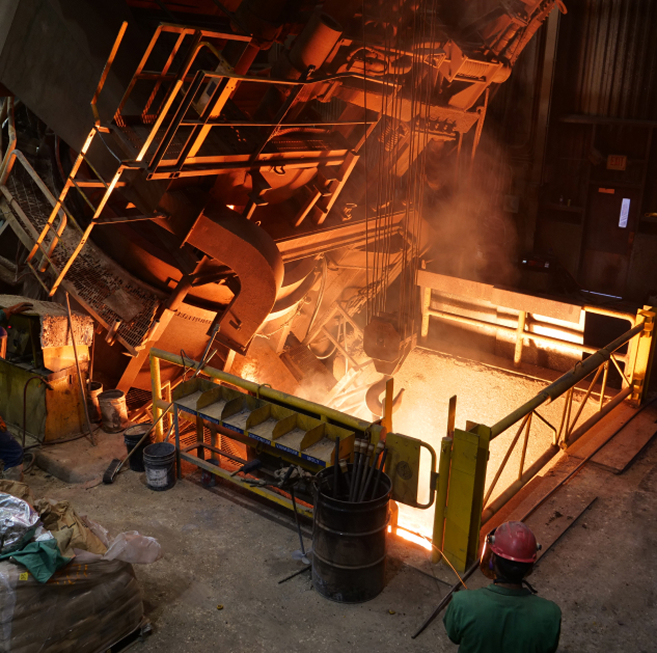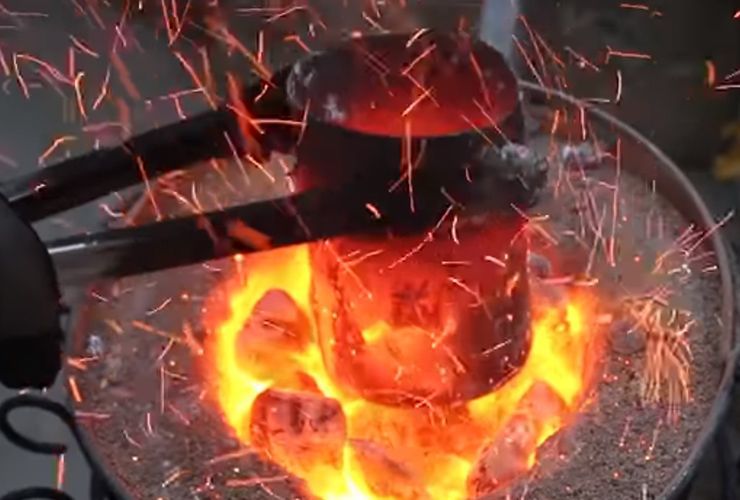Fusion of Art and Engineering: How Metal Casting Unites Creativity with Industry
Wiki Article
A Comprehensive Guide to Metal Casting: Benefits and Solutions Offered by Foundries
Metal casting is an important procedure in numerous sectors, providing countless benefits with the services of factories. These facilities transform liquified metal into specific and resilient components, accommodating particular client demands. By employing innovative technologies, factories assure top quality and effectiveness in manufacturing. The ins and outs of metal casting and the diverse methods entailed elevate vital concerns regarding its duty in modern production. What developments exist ahead in this crucial area?Understanding the Metal Casting Process
The metal casting process is a basic method used in making to develop intricate forms and components. This method includes putting molten metal into a mold made to create the wanted item. The process starts with pattern production, which acts as a theme for the mold and mildew. Aluminum Foundry. Numerous products, such as sand, metal, or ceramic, are used for mold-making, relying on the particular requirements of the casting
Once the mold is prepared, molten metal is poured right into it and allowed to solidify and cool. After solidification, the mold and mildew is removed, exposing the actors component. Various strategies, including sand casting, financial investment casting, and pass away casting, are used, each matched to various applications and products. Quality control measures, such as inspections and testing, are vital to assure the final product fulfills requirements. On the whole, the metal casting process plays a vital duty in producing parts for sectors varying from auto to aerospace.
Trick Benefits of Metal Casting
Metal casting offers considerable advantages that make it a favored manufacturing method in different markets. Its design versatility and accuracy enable for intricate forms, while cost-efficient automation boosts performance. In addition, the adaptability and strength of materials made use of in casting add to the durability of the end products.Style Versatility and Precision
Releasing remarkable layout flexibility and accuracy, metal casting permits developers and engineers to develop elaborate forms and features that would certainly be difficult or challenging to attain with various other manufacturing techniques. This capability allows the production of intricate geometries, internal structures, and fine information that enhance item performance and aesthetic appeals. Furthermore, various casting methods, such as sand casting, financial investment casting, and pass away casting, offer further choices for modification, fitting varied product properties and project requirements. The flexibility of mold and mildews allows adjustments during the style phase, enhancing the change from principle to last product. Ultimately, metal casting stands apart for its ability to provide high-precision components, making it a vital process in industries ranging from vehicle to aerospace and past.Economical Mass Production
Economical mass production stands as one of the main advantages of metal casting, enabling makers to generate large quantities of components at a reduced expense per device. This performance emerges from the capacity to create complex molds that can be recycled several times, significantly minimizing setup and operational prices. Additionally, metal casting processes, such as sand casting and pass away casting, permit high throughput, making it viable to satisfy the needs of large manufacturing runs. The lowered product waste and power usage further enhance price financial savings, making metal casting an appealing option for industries requiring mass parts. Generally, the affordable nature of metal casting settings it as a recommended method for suppliers going for economic efficiency in their production procedures.Material Adaptability and Strength
Among the standout qualities of metal casting is its impressive material adaptability, which permits the use of a wide variety of steels and alloys. This adaptability makes it possible for manufacturers to choose products that best fit their details applications, from aluminum and bronze to iron and steel. Each metal provides one-of-a-kind buildings, including varying degrees of toughness, corrosion resistance, and thermal conductivity. As a result, metal casting can generate parts that meet rigid efficiency requirements throughout diverse markets, such as auto, aerospace, and building. In addition, the stamina of actors metals can be boosted via different therapy procedures, guaranteeing longevity and longevity. Metal Casting. Generally, the mix of product convenience and inherent toughness makes metal casting a recommended option for generating high-grade partsKinds Of Metal Casting Strategies
Metal casting incorporates a range of methods that deal with different production demands and product residential or commercial properties. Common methods include sand casting, which uses a sand mold for complex shapes, and investment casting, recognized for its precision and surface coating. Pass away casting is one more method that employs high-pressure injection of liquified metal right into molds, ideal for automation of tiny components.Shell molding offers a faster different, utilizing a resin-coated sand to produce thin-walled molds, while shed foam casting enables elaborate designs without the demand for a core.
Furthermore, constant casting is utilized for generating long sections of metal, such as sheets or bars, by strengthening molten metal in a continuous process. Each method is and offers special advantages picked based on variables like the needed detail, manufacturing volume, and material kind, making sure exceptional end results in metal construction throughout numerous markets.
The Role of Foundries in Metal Casting
Shops play a pivotal role in the metal casting procedure, acting as the centers where molten metal is transformed right into finished products. These specialized facilities are geared up with the required devices and innovations to take care of various metals, making certain top quality end results. Foundries are in charge of several vital features, consisting of melting the metal, pouring it into mold and mildews, and permitting it to strengthen.Additionally, they preserve stringent safety and security and ecological standards to safeguard workers and lessen eco-friendly impact. Competent specialists and designers work together to maximize casting processes, improving efficiency and lowering waste. Foundries additionally engage in quality assurance steps, guaranteeing that the last products satisfy certain resistances and specifications. This quality control is vital for markets that rely upon accurate elements, such as automobile and aerospace. Therefore, foundries contribute considerably to the overall production landscape, making it possible for technology and development throughout different sectors.
Custom Metal Casting Services
Custom metal casting solutions use tailored design solutions that fulfill certain client requirements. These solutions likewise supply material selection proficiency, guaranteeing the right metal is chosen for the preferred application. Such versatility and understanding enhance the overall top quality and efficiency of the end product.
Tailored Style Solutions
Customized style remedies in metal casting offer suppliers with the versatility to develop elements that fulfill particular efficiency and aesthetic demands. Factories supply customized services that permit clients to specify measurements, shapes, and surface coatings to accomplish desired results. This customization procedure typically includes collaboration between designers and designers, making certain that the end products line up with operational requirements and sector criteria. Advanced technologies, such as computer-aided style (CAD) and simulation software program, allow accurate modeling and testing of components before production, improving and reducing errors effectiveness. By leveraging tailored style options, services can enhance capability while decreasing waste and costs, eventually causing an extra affordable side in the marketplace. This flexibility is important for industries needing distinct applications and specifications.Product Selection Knowledge
When selecting materials for metal casting, proficiency plays a vital function in making sure that the ideal selection straightens with both efficiency requirements and cost-effectiveness. Factories employ experienced specialists that understand the residential or commercial properties of different metals and alloys, permitting them to advise perfect materials for certain applications. Variables such as toughness, corrosion resistance, and thermal conductivity are very carefully thought about to fulfill the customer's requirements. In addition, sector fads and developments in material scientific research notify these decisions, making it possible for foundries to remain competitive. By leveraging their know-how, foundries can help customers in steering with facility material choices, inevitably causing boosted product high quality and lowered production prices. This customized knowledge is important for accomplishing effective outcomes in custom-made metal casting solutions.Quality Assurance in Metal Casting
Quality control in metal casting is vital to assure that click the end products satisfy the called for specifications and performance criteria. Foundries utilize a selection of techniques and techniques to ensure the highest high quality of actors components. This procedure starts with stringent material examinations, verifying that resources adhere to industry requirements. Throughout the casting procedure, real-time monitoring and testing are carried out to analyze parameters such as temperature, mold stability, and dimensional accuracy.
Applications of Metal Castings Throughout Industries
Metal castings play an important duty in various sectors, working as the backbone for plenty of applications. In the automotive market, cast parts such as engine blocks and transmission real estates are required for automobile efficiency and reliability. The aerospace industry depends on accuracy spreadings for crucial elements that assure safety and effectiveness in trip. Additionally, the building sector makes use of metal castings for fixtures, fittings, and structural aspects, boosting the durability of buildings and facilities.Moreover, the power market advantages from spreadings made use of in generator blades and various other tools crucial for power generation - Metal Casting. The medical field also utilizes metal spreadings in tools and gadgets, demonstrating the adaptability of this production procedure. Overall, metal castings are important to the capability and development of varied fields, showcasing their significance in contemporary innovation and framework advancement
Often Asked Concerns
What Products Are Generally Used in Metal Casting?
Typical products made use of in metal casting consist of light weight aluminum, iron, steel, brass, and bronze. Each product offers distinct buildings ideal for various applications, permitting producers to pick the finest option based upon corrosion, stamina, and weight resistance.Just how Long Does the Metal Casting Refine Generally Take?
The metal casting procedure generally takes a number of hours to a couple of days, depending on aspects such as the complexity of the style, kind of metal made use of, and you can try these out the particular casting approach utilized by the foundry.
What Is the Ecological Impact of Metal Casting?
The ecological effect of metal casting consists of energy consumption, exhausts, and waste generation. Foundries usually carry out steps to minimize these impacts, such as recycling materials and utilizing cleaner modern technologies to decrease their ecological impact.Can Metal Casting Be Done for Small-Scale Projects?
Metal casting can without a doubt be carried out for small jobs. Various factories provide to such requirements, offering customized options that suit limited production runs while keeping quality and precision in the end products.What Are the Security Actions in Metal Casting Foundries?
In metal casting shops, security procedures consist of individual protective equipment, appropriate air flow, training on tools usage, emergency situation procedures, regular maintenance checks, and adherence to sector safety requirements to lessen threats connected with molten metal and dangerous materials.Furthermore, metal casting processes, such as sand casting and die casting, enable for high throughput, making it practical to fulfill the needs of large-scale manufacturing runs. One of the standout features of metal casting is its impressive product convenience, which permits for the use of a wide array of steels and alloys. Additionally, continual casting is made use of for creating long areas of metal, such as sheets or bars, by solidifying molten metal in a continual process. Factories play an essential function in the metal casting procedure, offering as the centers where liquified metal is changed right into ended up items. Usual products made use of in metal casting consist of light weight aluminum, iron, steel, bronze, and brass.
Report this wiki page